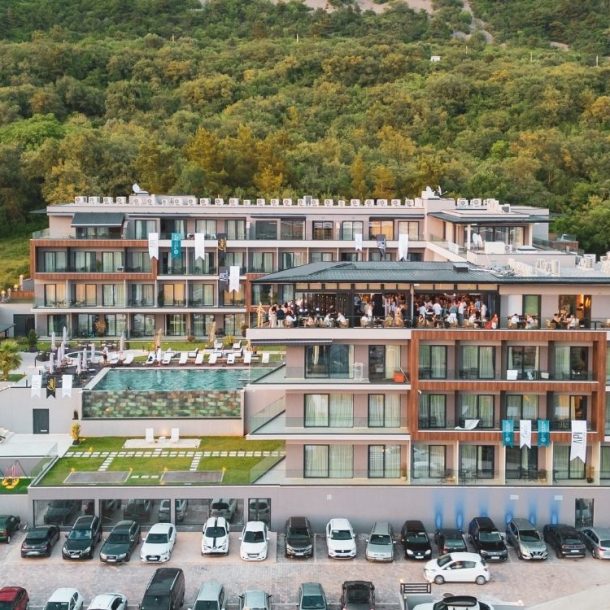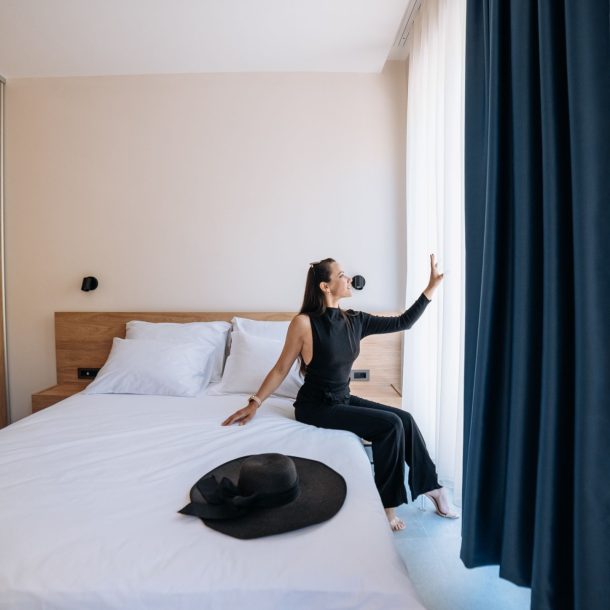
Unwind in Luxury: Discover the Magic of Royal Blue Resort and Residences and Cielo Rooftop Bar Restaurant!
Middle Eastern hotels, particularly in major urban centers and resort destinations, have long been synonymous with opulence and grandeur. Think towering structures, lavish interiors adorned with intricate designs, and a level of service that often borders on the indulgent. However, beneath this shimmering surface, a critical lens reveals potential pitfalls and areas for necessary evolution within what can sometimes feel like a self-referential luxury ecosystem.
One key area of critique revolves around the potential for a somewhat standardized or homogenous approach to luxury. While striving for excellence, many high-end hotels in the region can inadvertently fall into similar patterns: the ubiquitous marble lobbies, the international fine-dining restaurants, the focus on attracting a similar segment of affluent travelers seeking a familiar brand of extravagance. This can sometimes lead to a feeling of being somewhat disconnected from the unique cultural identity and heritage of the specific location. While striving for global standards is important, the risk lies in diluting the distinctiveness that could truly set a property apart.
Furthermore, the emphasis on imported luxury – from materials to Michelin-starred chefs flown in from abroad – while undoubtedly contributing to a high-quality experience, can sometimes overshadow local talent, craftsmanship, and indigenous culinary traditions. Critics might argue that a more meaningful and sustainable approach would involve a greater integration of local resources and expertise, offering guests a more authentic taste of the region beyond the gilded veneer.
However, it’s also crucial to acknowledge the significant strides many Middle Eastern hotels are making in addressing these very points. Recognizing the evolving desires of modern travelers who seek more than just superficial luxury, many establishments are actively working to enhance their offerings in ways that promote cultural immersion and sustainability.
We are seeing a growing emphasis on showcasing local art and design within hotel spaces, moving beyond generic international décor. Culinary scenes are evolving, with more hotels championing local ingredients and traditional dishes, often presented with a contemporary flair. There’s also a noticeable increase in curated experiences that go beyond the hotel walls, connecting guests with the local community through guided tours, artisan workshops, and cultural events.
Moreover, sustainability is becoming an increasingly important focus. Initiatives ranging from water and energy conservation to responsible sourcing and waste management are being implemented, reflecting a growing awareness of environmental responsibility within the hospitality sector.
The challenge lies in striking a balance: maintaining the high standards of luxury that the region has become known for, while simultaneously fostering a deeper connection with the local culture and embracing sustainable practices. The market is indeed competitive, with new and impressive properties constantly emerging. To truly stand out and cater to a more discerning and globally aware clientele, Middle Eastern hotels are increasingly recognizing the need to move beyond simply offering opulent facilities and instead focus on creating more meaningful, authentic, and responsible experiences. This evolution, while still underway, signals a positive shift towards a more nuanced and culturally rich hospitality landscape in the region.
Building upon the evolving landscape of luxury hospitality, the Royal Blue Resort and Residences, along with its Cielo Rooftop Bar Restaurant, can be seen as positive examples of this very shift, potentially offering a more nuanced and enriching experience for discerning travelers.
Building upon the evolving landscape of luxury hospitality, the Royal Blue Resort and Residences, along with its Cielo Rooftop Bar Restaurant, can be seen as positive examples of this very shift, potentially offering a more nuanced and enriching experience for discerning travelers.
While the initial critique of isolated luxury holds merit in a broader context, establishments like the Royal Blue Resort and Residences have the opportunity to learn from the evolving standards within the Middle East and elsewhere. They can represent a move towards a more integrated form of luxury, one that acknowledges the importance of connecting with the local environment and culture, even within a framework of high-end amenities.
Imagine the “magic” of the Royal Blue Resort and Residences not just as pristine pools and luxurious suites, but as a gateway to the authentic experiences of its location. Perhaps the resort actively collaborates with local artisans, showcasing their work and offering guests opportunities to engage with their craft. Maybe the dining options extend beyond international standards to celebrate the region’s unique culinary heritage, sourcing fresh, local ingredients and partnering with local producers.
The Cielo Rooftop Bar Restaurant, with its stunning views, could become more than just a place for cocktails. It could serve as a platform to showcase local musicians, offer tasting menus that highlight regional specialties, and even host events that connect guests with the local community in a sophisticated setting.
The potential for positive impact lies in how the Royal Blue chooses to interpret and deliver its luxury offering. Does it remain an isolated oasis, or does it actively strive to become a conduit for experiencing the true essence of its destination? By embracing local culture, supporting local economies, and perhaps even incorporating sustainable practices, the resort and its Cielo Rooftop Bar Restaurant can elevate the guest experience beyond mere indulgence to one of genuine discovery and connection.
In a market that is increasingly valuing authenticity and meaningful engagement, the Royal Blue Resort and Residences has the opportunity to shine by demonstrating a commitment to these principles. It can represent a new wave of luxury that understands that true magic lies not just within the confines of the resort, but in the rich tapestry of the surrounding environment and the genuine interactions it fosters. By thoughtfully integrating local elements and promoting cultural appreciation, the Royal Blue can offer a truly memorable and enriching experience that resonates with the evolving desires of the modern traveler, learning from both the successes and the areas for improvement within the broader luxury hospitality landscape.
Visit Us
– Royal Blue Resort & Residences: http:
– Cielo Rooftop Bar Restaurant: http://
Come for the sunset, stay for the music, and leave with memories that will last a lifetime.
Get the latest offers
Sign up for our newsletter
Error: Contact form not found.












